If you’re dealing with debt collection in Hawaii, it’s crucial to understand the laws that protect you. Hawaii debt collection laws ensure fair practices and offer consumers robust protections against harassment and unfair treatment by collectors. This article breaks down the essential Hawaii-specific regulations, your rights as a consumer, and practical steps to handle debt collection issues.
Key Takeaways
- The Fair Debt Collection Practices Act (FDCPA) establishes essential protections for consumers against abusive debt collection practices at the federal level.
- Hawaii’s state laws, including Chapter 443B of the Hawaii Revised Statutes, provide additional safeguards by requiring debt collectors to notify consumers of their rights and allowing for significant penalties for non-compliance.
- Consumers in Hawaii have rights regarding validation of debts and protections against harassment, including the ability to request a cease and desist from debt collectors and report unfair practices to the CFPB and FTC.
Federal Debt Collection Laws and Their Importance
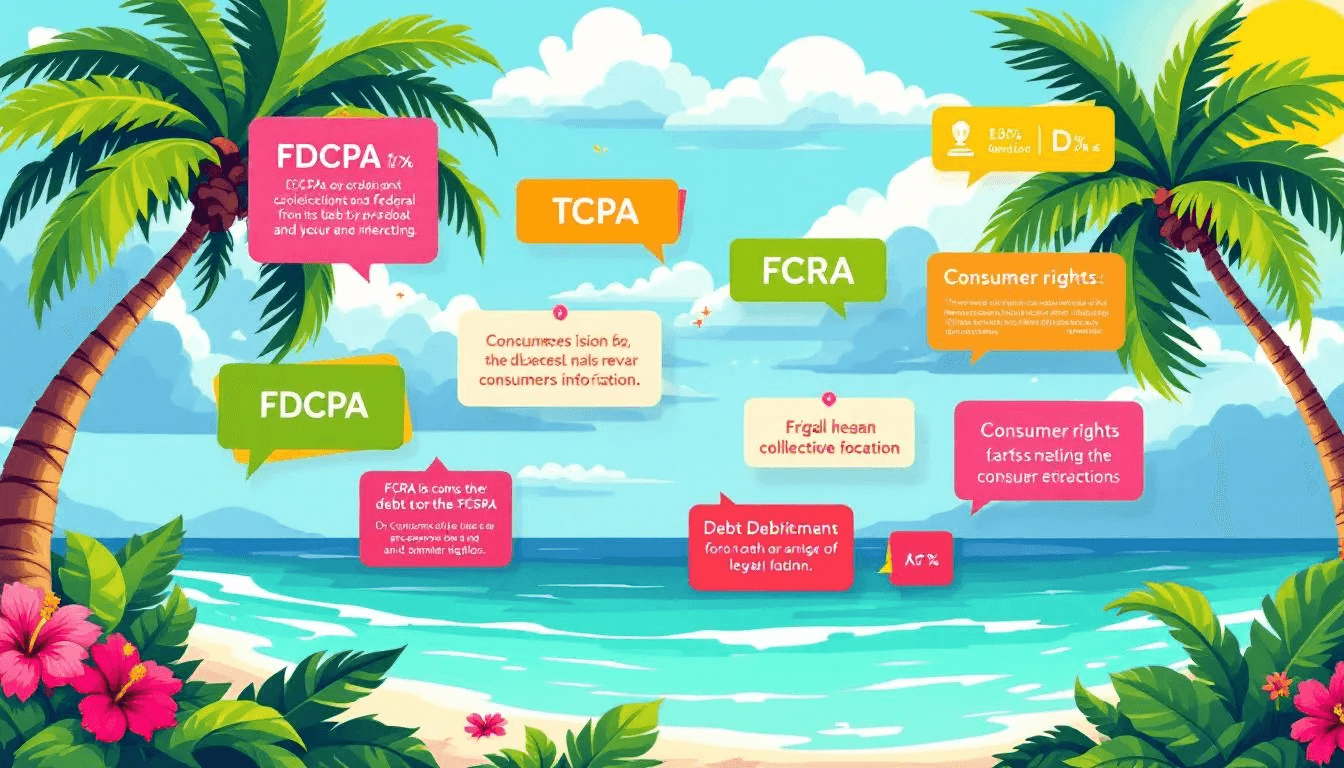

At the federal level, the Fair Debt Collection Practices Act (FDCPA) stands as the cornerstone of debt collection laws. Enforced by the (CFPB) and the Federal Trade Commission (FTC), the FDCPA aims to curb abusive practices by debt collectors. It prohibits threats, excessive calling, and deceptive methods, ensuring that debt collection is conducted fairly and ethically.
The FDCPA includes critical protections, such as restrictions on when debt collectors can contact you. They are forbidden from calling during inconvenient times, specifically before 8 a.m. or after 9 p.m. These boundaries help maintain your peace and protect you from undue stress.
The FDCPA is more than just a set of rules; it’s a shield for consumers. Familiarity with these federal laws empowers you to navigate interactions with debt collectors and protect your rights. The CFPB and FTC are there to support you, providing avenues for complaints and enforcement against fraudulent or abusive practices.
Hawaii State-Specific Debt Collection Protections
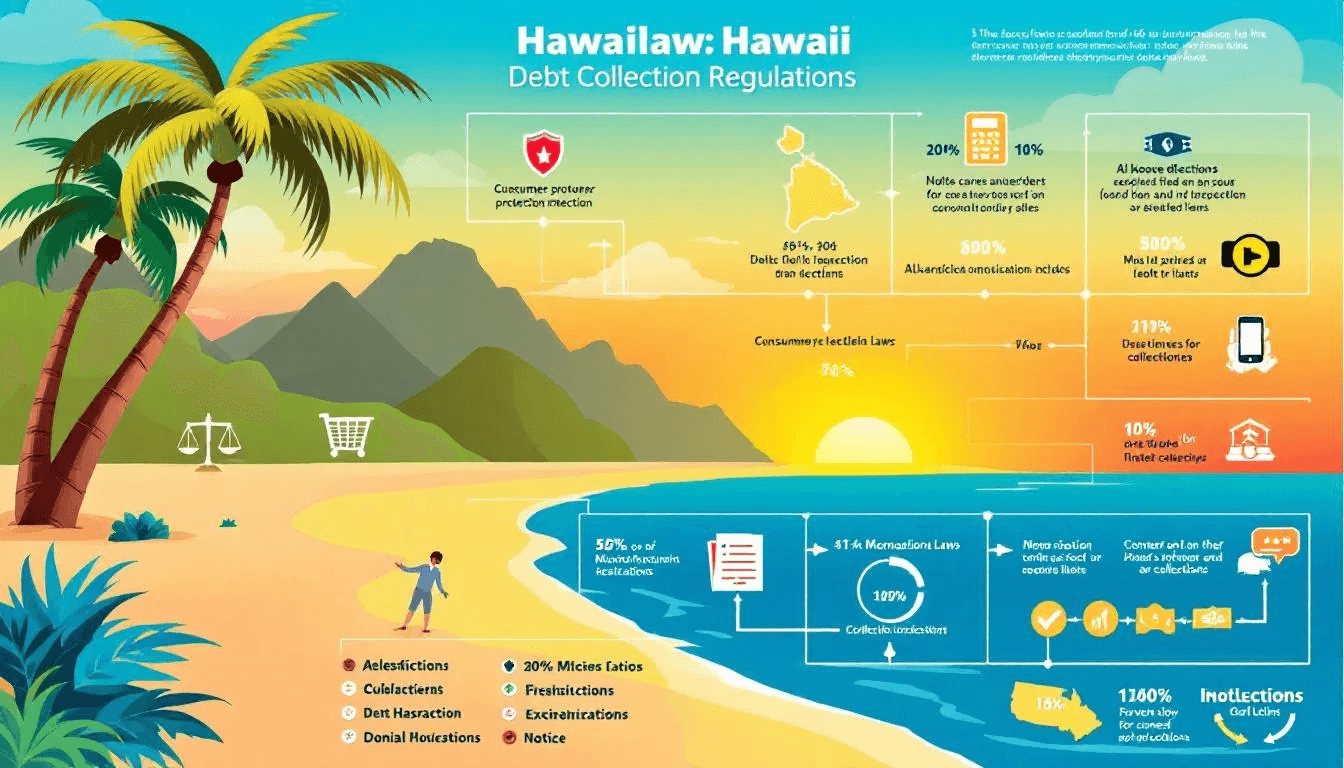

Hawaii adds another layer of protection through its own statutes, specifically Hawaii Revised Statutes Chapter 443B, which is a crucial section. These state-specific laws complement federal regulations, ensuring that debt collectors operating in Hawaii adhere to stringent standards.
Hawaii mandates that debt collectors provide consumers with written notice of their rights, reinforcing transparency and accountability. The Department of Commerce and Consumer Affairs plays a critical role in enforcing these rules, safeguarding residents from harassment. Non-compliance with these laws can result in hefty fines, up to $5,000 per violation, underscoring the state’s commitment to consumer protection.
These Hawaii-specific amendments ensure that the current measures against abusive practices are not just theoretical but actively enforced. Knowing these statutes allows you to hold debt collectors accountable and safeguard your financial well-being.
Statute of Limitations on Different Types of Debt in Hawaii
In Hawaii, the statute of limitations for most debts, including credit card debts and personal loans, is six years. This time frame applies to both written and oral agreements, providing a clear deadline for creditors to pursue legal action.
Auto loans, however, are subject to a shorter statute of limitations, with only four years to initiate legal proceedings. Understanding these limitations is crucial for both debtors and creditors. It helps debtors know when they might be free from old debts and guides creditors on the urgency of their collection efforts.
Registration and Licensing Requirements for Debt Collectors in Hawaii
Operating as a debt collector in Hawaii requires strict adherence to licensing regulations under the Collection Agencies Act. Key requirements include:
- Every debt collection agency must obtain a license.
- The license must be renewed every two years.
- Agencies must maintain a ‘Certificate of Good Standing’ to stay compliant.
A principal collector, responsible for daily operations, must be designated to ensure the agency’s adherence to these requirements. Additionally, a surety bond of $25,000 is necessary for the first office, providing financial assurance against potential misconduct. It is important to pay check these required details regularly.
Failure to comply with licensing requirements can lead to severe consequences, including significant fines or the prohibition of business operations. These regulations enforce that only reputable registered agencies engage in debt collection, protecting consumers from unscrupulous practices.
Consumer Rights Against Harassment by Debt Collectors
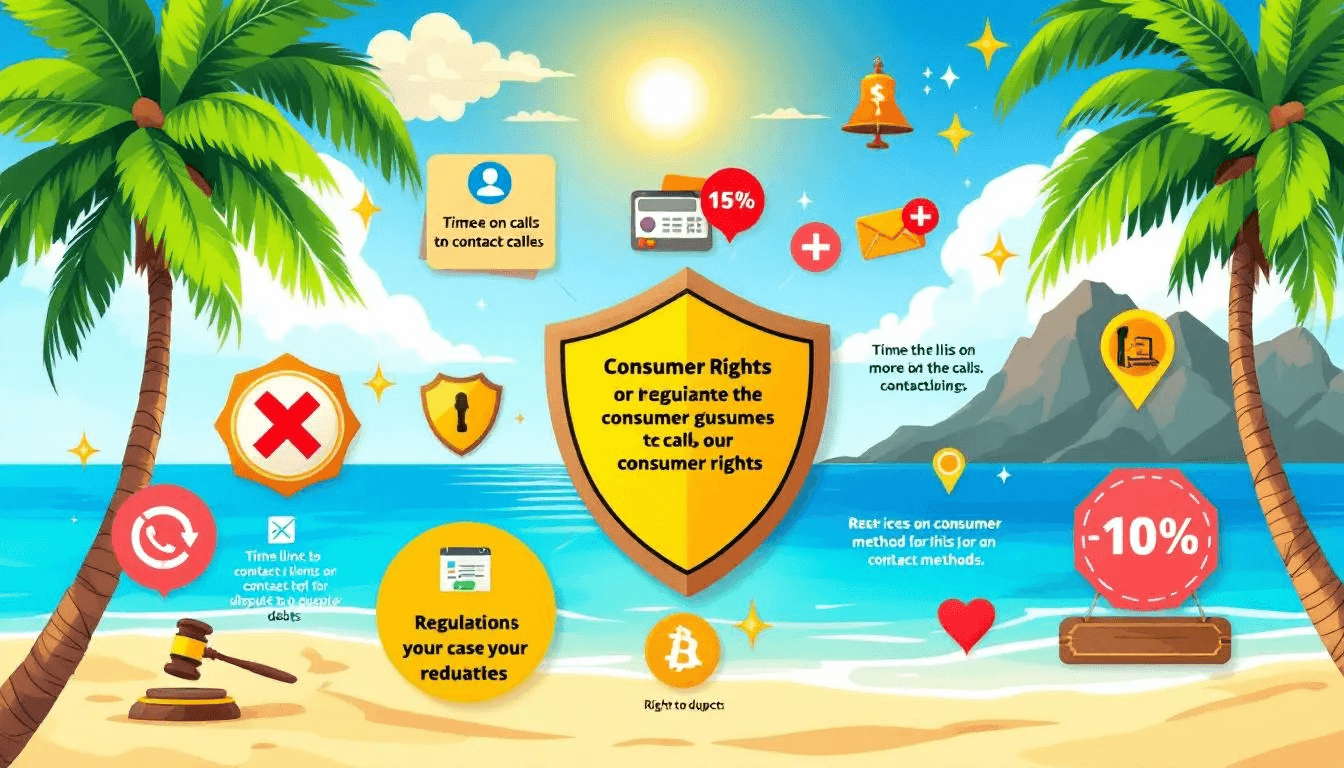

Your rights as a consumer extend far beyond just disputing inaccurate information. In Hawaii, debt collectors must not engage in deceptive or misleading practices when attempting to collect debts. This includes prohibiting threats of legal action if there is no intention to follow through.
If a debt collector knows that your employer prohibits such calls, they are not allowed to contact you at work. More broadly, under the FDCPA, you can request that debt collectors cease communication altogether, even if the debt is valid.
Facing harassment from debt collectors? Here’s what you should do:
- Document every incident meticulously, including dates, communication records, and any other relevant details.
- Submit complaints online to the CFPB, which typically responds within 15 days.
- If another agency is better suited to handle your complaint, the CFPB will redirect it accordingly.
Remember, you can also report to the FTC if you experience harassment. Exercising these rights enables you to protect yourself against unfair debt collection practices.
Validating Debt Claims
When a debt collector contacts you, you have the right to request validation of the debt within 30 days. A Debt Validation Letter verifies a formal request for proof that a debt is valid and collectible, ensuring that you are not paying for an erroneous or fraudulent claim.
Your letter should include:
- Your information
- Details of the debt
- A request for validation
- A deadline for response
If the debt collection agency fails to respond, you can dispute the debt with supporting documentation of your request. This step is crucial in safeguarding yourself against invalid claims.
How to Send a Cease and Desist Letter
A cease and desist letter is a formal request. It instructs a debt collector to cease all communication with you. Its primary purpose is to halt unwanted phone calls, providing you with some peace and quiet.
For the letter to be effective, it must be sent in writing, ideally via certified mail to maintain a record of sending and receipt. While the letter doesn’t prevent debt collectors from initiating a lawsuit, it does stop all other communications regarding the debt. Just remember, sending this letter might cause you to lose track of your debt, and debt collectors are allowed one final communication to inform you of their intended actions.
You can find a template for a cease and desist letter from SoloSuit.
Options for Settling Your Debt
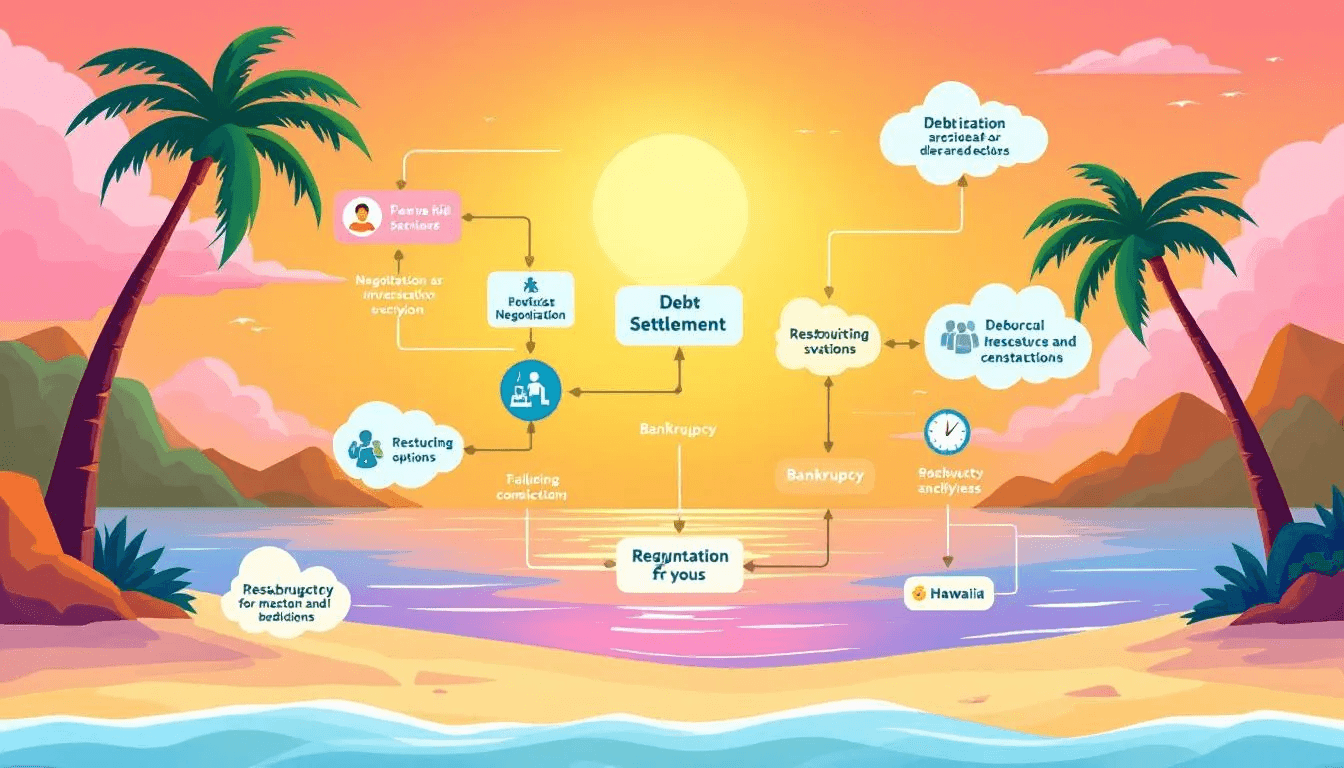

Debt settlement can often reduce the total amount you owe by 40 to 60%, making it a viable option for those struggling with large debts. Creditors may agree to settle debts when they perceive the debtor is at risk of bankruptcy, as it’s often better to recover a portion of the debt rather than nothing at all.
Negotiating with a creditor tends to be more effective when handled by a licensed attorney, who can leverage legal expertise to reach an engaging favorable agreement for clients in order to provide a structured path for each person to financial recovery.
Legal Actions: What to Do if Sued for Debt
If you find yourself sued for debt in Hawaii, it’s crucial to:
- Respond within 20 days to avoid a default judgment against you.
- Address each allegation in the Summons and Complaint.
- Establish affirmative defenses in your Answer.
Hawaii does not charge a fee for filing an Answer in response to a debt lawsuit. SoloSuit can help you draft your response efficiently, ensuring all necessary details are included and even providing attorney reviews.
Protecting Exempt Income from Garnishment
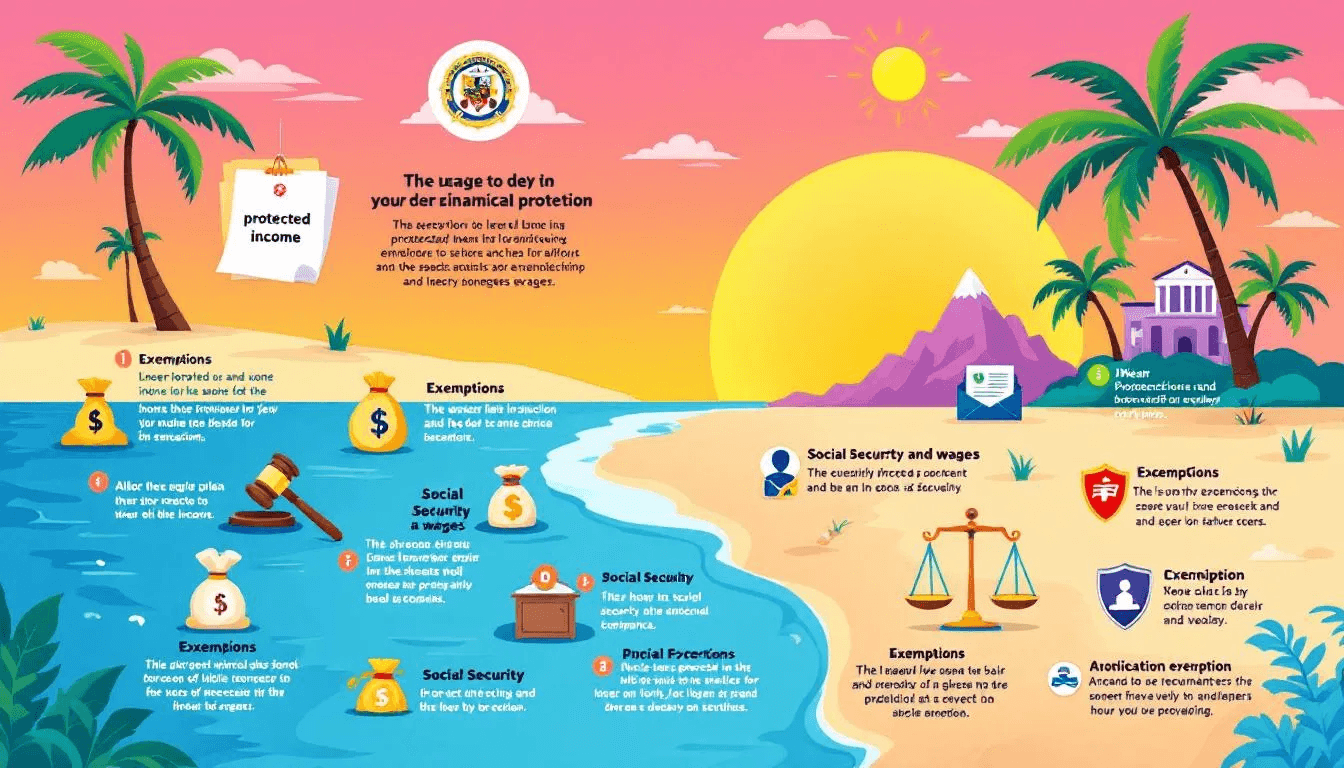

Certain types of income are legally safeguarded from garnishment under Hawaii law, including:
- Social Security benefits
- Veterans’ benefits
- Workers’ compensation
- Pension payments
- Specific retirement distributions These protections ensure that essential funds remain accessible.
If a garnishment is applied to exempt income, you can file a Motion to Quash Garnishment to legally challenge it. Understanding these protections can help you secure your financial stability.
Tips for Maintaining Good Credit Standing
Maintaining good credit standing is essential for financial health and can affect everything from loan approvals to interest rates. To ensure timely payments, consider setting up automatic payments or reminders. Keeping your credit balances low, ideally below 30% of your total credit limit, can significantly boost your credit score.
Additionally, maintaining a long credit history makes showcases consistent payment practices, which lenders view favorably in life. Only apply for credit when necessary to renew, as frequent applications can signal financial distress to lenders.
New to credit? Secured credit cards or credit builder loans can help establish a good credit history. These strategies will help you maintain good standing and access better financial opportunities.
How to Report Unfair Debt Collection Practices
If you experience unfair debt collection practices, it’s crucial to report them to the appropriate authorities. Consumers can file complaints through the (CFPB), which investigates and acts on these reports. The Federal Trade Commission (FTC) also accepts reports regarding deceptive or abusive debt collection practices.
Hawaii Revised Statutes outline specific procedures for handling consumer complaints against debt collectors, ensuring that your concerns are addressed promptly and effectively. Violations of Hawaii’s debt collection laws may lead to civil penalties in addition to fines, providing a strong deterrent against unfair practices.
Summary
Understanding Hawaii’s debt collection laws, alongside federal regulations, equips you with the knowledge to protect your rights and manage your debts effectively. From knowing the statute of limitations to recognizing your rights against harassment, each aspect of this guide serves to empower you in dealing with debt collectors. By staying informed and proactive, you can navigate the complexities of debt collection with confidence and maintain your financial health.
Frequently Asked Questions
What are the garnishment laws in Hawaii?
In Hawaii, employers may not terminate employees due to wage garnishments, and they can withhold a maximum of 5% of the first $100 of disposable wages, 10% of the next $100, and 20% of any amount exceeding $200 per month. This structure ensures that garnishments are regulated while providing some financial protection to employees.
What is the statute of limitations for credit card debt in Hawaii?
The statute of limitations for credit card debt in Hawaii is six years. After this period, creditors may be barred from filing lawsuits to collect the debt.
How do I request validation of a debt?
To request validation of a debt, send a Debt Validation Letter to the collection agency within 30 days of their contact. This ensures your right to review the legitimacy of the debt in question.
What should I do if a debt collector is harassing me?
If a debt collector is harassing you, document all incidents and file a complaint with the CFPB or FTC. Additionally, you may request that the debt collector cease all contact.
Can all types of income be garnished in Hawaii?
Certain types of income, like Social Security and veterans’ benefits, are protected from garnishment in Hawaii. Therefore, not all income can be garnished.

